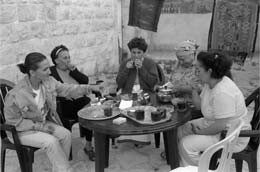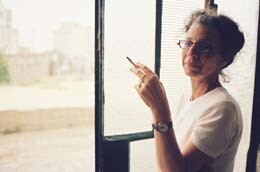The Electronic Intifada 26 April 2005

Film still from “Soraida, A Woman of Palestine”
Never diverting attention away from her subject, Rached’s camera seamlessly acts as a silent narrator. Since we are never given anyone’s name, unless it comes up in conversation, and are unaware of the questions that Rached asks, we instantly become part of Soraida’s inner circle. We sit at the table with them as they drink tea, hang the laundry out to dry, or cook dinner; we are witnesses to their lives, but remain silent observers.
One of the most memorable women in Soraida’s group repeatedly recollects her dreams, which are always intertwined with the Israeli occupation. Even though some are playful, such as one in which Israeli president Ariel Sharon shrinks into Little Sharon right before her eyes, we quickly realize that there is no escaping their reality. She shrewdly explains, “They never leave us alone, not in life, not in dreams, there’s no end to it.”
And there’s no end to the painful experiences that these women have been through. Reliving these life-threatening events for Rached, Soraida walks us down the alleyway that she ducked into when she was chased by Israeli soldiers as her dream-ridden friend lies on the floor of her kitchen to show how she hid her head behind the oven for protection during shootouts. Some of the most surprising scenes are of Soraida’s children as they play the “Invasion of Ramallah” with their dolls and her five-year-old son Aram tells her that he wants to commit suicide “to have peace.”

Tahani Rached (Photo: Yann Cleary)
But Soraida struggles against her many identities. She is part fighter who wants to stand up to her oppressor, part mother who must protect and care for her children, part daughter and part sister. “I’ve always known that I live with many identities,” she reflects, but she also knows that she must stay dedicated to her family. Humanity is a constant theme throughout the film. Even though some of her friends do not agree, Soraida emphasizes her need to humanize her oppressors. Talking about the Israeli soldiers she explains, “True he is the enemy, who wears a uniform and represents a system, but he has a family, loved ones, a soul … in killing him, you also kill something in yourself.”
Rached’s Soraida, A Woman of Palestine is an exemplary documentary, which unobtrusively depicts the inner thoughts, feelings and daily lives of women living under occupation. Soraida, the main protagonist, is a philosophically minded woman who consistently fills the viewer with powerful words of wisdom. But her insight and knowledge forges beyond the Palestinian-Israeli conflict. Soraida importantly observes, “The real damage, the real war is about our humanity.”
Jenny Gheith is a film critic for the Electronic Intifada
Related links:



